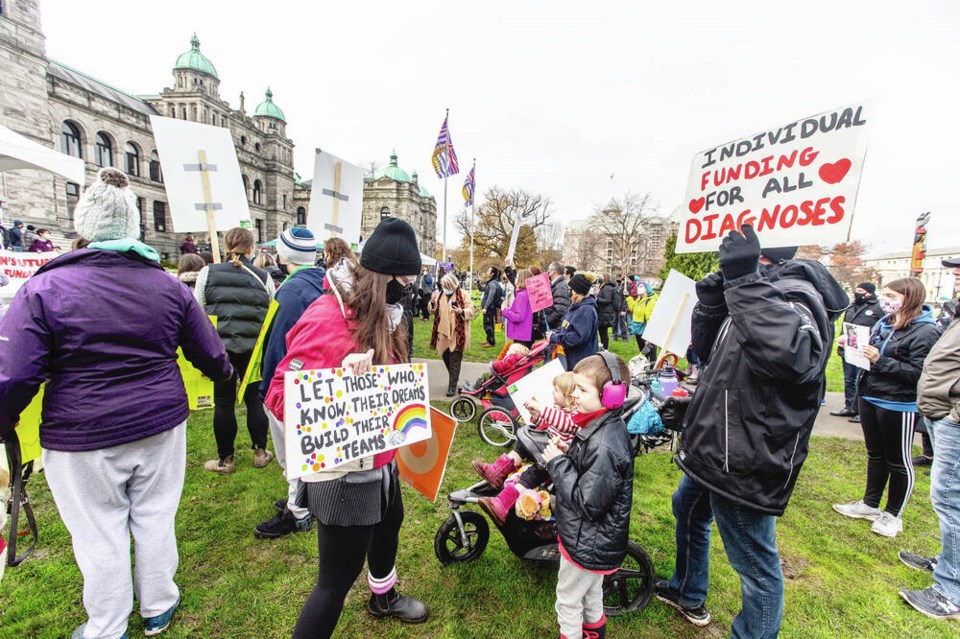Dear incoming premier of B.C.:
I am writing to you about the leadership British Columbia needs.
A critical litmus test for your leadership is whether you will end the disastrous and unpopular plan to claw back individualized funding for children with autism.
Ever since the Minister of Child and Family Development blindsided families last fall with her badly timed, detail-bereft and ill-considered announcement to create “hubs” with the money being clawed back, your government has been justifiably and fiercely criticized. It is a plan that disempowers families and results in harm and discrimination against vulnerable children.
Here are five reasons why it’s a bad plan.
First, there was almost no planning or consultation and the result has been massive stress and negative impacts on people across B.C.
Parents are realizing they won’t be able to keep working with the same therapists and interventionists who have known their children for years. Service providers, many of them female small business owners, are being put out of business.
Behavioural consultants and interventionists are leaving the profession and heading to other jurisdictions because of the uncertainty created for their future employment.
Teachers are recognizing that students will depend more on already underfunded and overtaxed school supports. Medical experts in autism have condemned the “hubs” plan as unscientific and not evidence-based.
The minister and her staff seem to believe they are better decision-makers for children with disabilities than parents. The minister has acted as though parents of children with autism are deluded for not accepting the assertion that MCFD will be better at organizing their children’s lives. Incoming premier, would you want MCFD to have the power to organize your children’s lives?
Second, the “hubs” plan ignores the government’s commitment to uphold the United Nations Declaration on the Rights of Indigenous Peoples, and appears ignorant of the colonial legacy of mistreatment of Indigenous children by government.
The First Nations Leadership Council has made it clear that the plan violates Articles 21 and 22 of UNDRIP and has said it “will increase access barriers for Indigenous children, and result in deepening the racism and discrimination our children face.”
Third, the “hubs” plan relies on rhetoric over substance. The words “trauma-informed” accompany every trauma-inducing announcement MCFD makes.
The word “inclusive” is used to describe programs families have been excluded from consulting about. And when “hubs” suddenly became “family connection centres,” no one was fooled into thinking that a vague vision of generic pan-disability centres without specialists where children with wildly different diagnoses and undiagnosed children are all grouped together could be fixed through rebranding.
Fourth, the “hubs” plan gives MCFD a role it should not have, and must not play.
MCFD’s primary role is to protect children from neglect and abuse. It is not designed to support parents of children with disabilities or work with parents as a team to provide the best care. One recent example of MCFD’s inability to work with parents as a team comes from the Ombudsperson, who ordered MCFD to pay grandparents caring for a severely disabled child the $242 a month it was pocketing from the federal government and never forwarding.
As the ombudsperson remarked: “Rarely does our office receive a complaint where the public organization has already acknowledged that its administrative practices are causing hardship, without any clear indication of how it intends to resolve the situation.”
Why is the current government allowing a ministry that can’t do its job without the oversight of other government entities to expand its reach?
Fifth, the “hubs” plan has been tried elsewhere. And failed. In Ontario, with Doug Ford’s hubs-based system, the wait list has grown to more than 51,000 children waiting for autism services.
In the legislature recently, Premier John Horgan said that the clawing back of funding for families of children with autism is “a direct result of all those families that cannot currently access care because they don’t have a diagnosis.”
Is there really a direct connection?
No, there isn’t. Not if the government is capable of doing two things at once: Continuing individualized funding for families of children with autism and also improving supports for the families who have children with other diagnoses or no diagnosis.
Can you do those two things?
I think you can. You just need to choose to do them. This is a choice that shows strong leadership. You do not need to sacrifice therapies that work for many children with autism in order to support other children with disabilities. You can build on what works to support all children with disabilities.
Don’t build up MCFD. Instead, support the families and service providers who actually love and care for these children. That would be the wisest, most moral and fiscally responsible choice of all. It would be leadership.
>>> To comment on this article, write a letter to the editor: [email protected]



